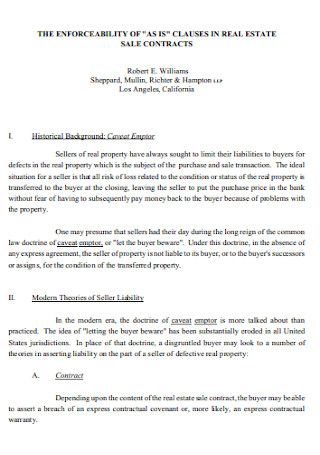Real estate contracts are legally binding documents that outline the terms and conditions of a property transaction between a buyer and a seller. These contracts are essential to protect both parties involved in the transaction and ensure a smooth process.
1. Property Description
One of the most important clauses in a real estate contract is the property description. This clause must provide a detailed and accurate description of the property being sold, including its address and legal description. It can also include important details such as the size of the property, number of rooms, and any fixtures or appliances included in the sale.
2. Purchase Price
The purchase price clause outlines the agreed-upon amount that the buyer will pay to the seller for the property. It should specify whether any deposits have been made, the payment schedule, and any conditions or contingencies related to the purchase price, such as financing or appraisal requirements.
3. Financing and Contingencies
This clause is crucial for buyers who require financing to purchase the property. It outlines the terms and conditions related to the financing, including any contingencies for obtaining a loan. Common contingencies include a specified interest rate, loan approval deadlines, and the consequences if the buyer is unable to secure a loan within the specified timeframe.
4. Inspection and Due Diligence
The inspection and due diligence clause allows the buyer to conduct inspections and investigations to ensure the property is in satisfactory condition and meets their requirements. It should outline the scope of inspections allowed, the timeframe for conducting inspections, and procedures for addressing any issues discovered during the inspection process.
5. Closing and Possession
This clause specifies the date and location of the closing, where all necessary documents are signed, and ownership of the property is transferred from the seller to the buyer. It also includes details about possession, indicating when the buyer will take possession of the property after the closing and any conditions related to occupancy.
6. Default and Remedies
The default and remedies clause outlines the consequences if either party fails to fulfill their obligations as stated in the contract. It typically includes details about the specific remedies available to the non-defaulting party, such as termination of the contract, damages, or the ability to seek specific performance through a court order.
7. Disclosures
Sellers are legally required to disclose certain information about the property, such as known defects and environmental hazards, to potential buyers. The disclosures clause ensures that the seller provides all relevant disclosures as required by local laws. Buyers should carefully review this clause to ensure they receive all necessary information about the property’s condition and potential risks.
8. Dispute Resolution
In the event of a dispute between the buyer and seller, the dispute resolution clause outlines the procedures and methods to resolve the conflict. Options may include mediation, arbitration, or litigation. This clause is essential for guiding the parties towards a resolution in the most efficient and fair manner possible.
9. Closing Costs
The closing costs clause specifies who is responsible for paying the various fees and expenses associated with the closing of the real estate transaction. These costs may include title search fees, attorney fees, transfer taxes, and other related expenses. The clause should clearly outline which party is responsible for each specific cost.
10. Governing Law
This clause states the governing law that applies to the real estate contract. It ensures that the contract is interpreted and enforced according to the specified jurisdiction’s laws. The governing law may vary depending on the location of the property and the preferences of the parties involved.
Real estate contracts are complex legal documents that should be drafted and reviewed by qualified professionals to ensure all necessary clauses are included and properly worded. Whether you are buying or selling a property, understanding these key clauses is crucial for protecting your rights and interests throughout the real estate transaction.
